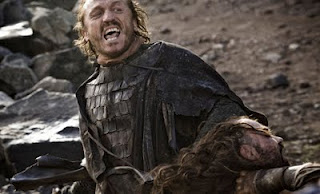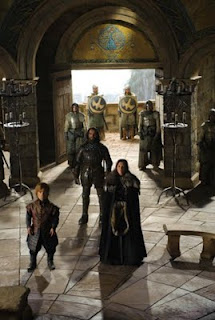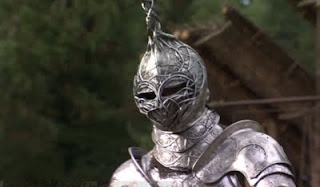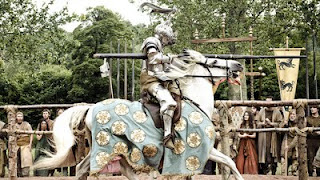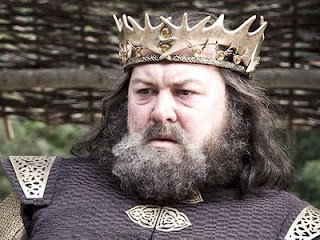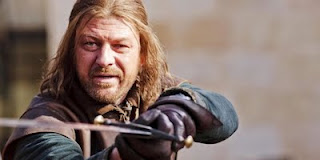Swords are finally clashing in Game of Thrones and our reviewer Kieran Mathers is on hand to pick over the aftermath. As always, this review comes with a mild spoiler warning. If you’re new to Game of Thrones, don’t forget to check out our primer!
At last we get some meaty and considerable violence! Headless horses, charging knights, sweeping swords, battering shields and brother-on-brother duelling – this is combat at its most graphic, and all the stronger for it. The violence of G.R.R. Martin’s prose is not lessened, and is all the more horrifying to see. In fact, this episode is all about violence and its consequences. You also get noisy blowjobs, but hey, it’s HBO.
This week the action focuses on Eddard Stark (Sean Bean) in King’s Landing and Catyln Stark (Michelle Fairley) who is travelling to the Eyrie with a particular prisoner in tow. It’s good to see Michelle Fairley finally demonstrate some nobility and leadership in her portrayal of Catyln, leading her assembled band into the mountains and out-foxing the pursuing forces. Here we have our first real, extensive show of combat.
Sadly, while it portrays the confusion of battle rather well, the show doesn’t do this deliberately. The attacking mountain clans literally come out of nowhere, with little explanation of who they are. Having read the book, I knew where these shaggy soldiers had come from and why they were attacking. But it wasn’t clear from the show why this fight erupted and, for some, I dare say it might have been a little confusing.
Equally frustrating was the fact it was fought to the death, with bodies lying left, right and centre. I know that the creators of this show are very proud of their ‘re-assessment’ of the fantasy genre, but they often fall into lazy cliché. It’s even more annoying because they quite often don’t. I’ve complained about their castles before, so let’s talk about fighting instead.
People very rarely hang around for a fight when they are losing. Most medieval battles; large or small, fought to the first rout – the men that ran generally lost. Equally, fighting to the death is over-rated (especially for the loser) and didn’t often happen. So it would have been better to see the mountain men lose and then flee, rather than just showing a field of corpses. That could have still had enough death for the cameras and not ruined the realism that had been created.
It’s more annoying when you consider that the show includes clichés which were deliberately avoided by the book. In general, this adaptation has been very good at getting across the shape and flow of the novel rather than the detail, but this is one of the areas where the detail should have taken precedence. I’m also getting slightly tired of semi-pornographic close ups of deadly wounds. When Sir Hugh of the Vale was killed, the purpose of the close-up was to show the horror of it from the children’s perspective. The smashed face of an anonymous clansman is nothing more than an unnecessary moment of gratuitous horror. Much more can be made of the battle between Gregor “The Mountain” Clegane (Conan Stevens) and his brother Sandor “The Hound” (Rory McCann), which breaks out at the Hand’s Tournament.
I was impressed by Ser Loras Tyrell’s armour; it’s great to see such hard work going into the consistently excellent costumes. They also capture the spirit of the books; incredibly clad knights in impressive armour doing battle against one another. A great pageant of combat.
It was also good to see chivalry and cynicism competing in the joust, with Ser Loras using a dirty trick to unseat the Mountain. The naiveté of Sansa Stark (Sophie Turner) was nicely played against the all-knowing cynicism of Littlefinger (Aiden Gillen), as she still believed in the nobility and honesty of knighthood. What worked especially well was the Hound defending Ser Loras from the Mountain; a man who hates knights defending the helpless from one of them. This was a better fight as well, and a little slower than one might expect. We’ve come to expect silky smooth combat, especially influenced by the Chinese style of balletic fighting. However, whether the slower pace was due to safe choreography (unlikely, as I’ve seen the Royal Shakespeare Company batter the hell out of each other on stage at considerable speed) or a directorial consideration, it really worked. It had a brute physicality which made it impressive.
But, despite all the swordplay, the real advance in this episode was Eddard Stark’s confrontation with Robert Baratheon (Mark Addy) over the assassination of Daenerys Targaryen, unseen but not forgotten. We see the politics of Kingship clashing with a principled stand of honour, and see how these two extremes lead to problems of their own. Mark Addy as the hate-fuelled Robert is particularly impressive, a man so used to absolute obedience that his only reaction to his best friend’s resistance is to shout and scream, threatening to brand him a traitor. This lack of self-control, of indulging every whim to the utmost, is what makes Robert such a poor king.
The fireworks of this scene overshadow two others, which were excellent. The previous episode’s tendency to allow exposition to override drama has been reined back, and the scene between Lord Varys (Conleth Hill) and Littlefinger dripped with threat, cleanly edited and written as tight as a drum. It might be bold to say it, but the mannered dialogue of these two duelling spy-masters was Shakespearian in its language and implication, and its intimacy more befitting the stage than the screen. Whoever wrote the script deserves a prize – this dialogue is better than G.R.R. Martin’s in places, and the actors made it their own. A triumph of adaptation!
There was also a surprisingly touching scene between King Robert and Queen Cersei (Lena Headley) discussing their broken marriage. When a relationship is forced to continue without any desire from either participant, then it becomes destructive to both parties and the honesty that the characters demonstrate here was a good contrast to all the scheming, plotting and general backbiting. It also shows another aspect to King Robert’s character, that he has lost the only thing he ever truly wanted.
The titular duel at the end, where a well-drawn character is brutally killed off with little ceremony, was a good moment. The duel itself is skilled choreography, and the honest arrogance of Jaime Lannister (Nikolaj Coster-Waldau) is wonderful to see. However, the wide shots and the close-ups do not really correspond, as the bodies of the Lannister guardsmen appear to move between shots. I don’t particularly like pointing out continuity errors, but this one was pretty serious if even I noticed it. But, as spoiled as we are by the fighting in this episode, it wasn’t as good as the combat before.
The final word goes to the sellsword (the Westeros term for a mercenary) Bronn, played by Jerome Flynn, one half of the old singing and acting duo Robson & Jerome. These two were made famous by the TV show Soldier, Soldier in the UK and seemed to be typecast by it for a long time. However Bronn, with his attitude to life and apparent source of all humour within the show, is a great addition and as good as we could have hoped for. The chemistry with Tyrion Lannister, which will become crucial later on, is definitely there.
So the body count continues to rise, but Eddard Stark won’t be able to for a while. Bring on the next bloody chapter of this impressive saga…

